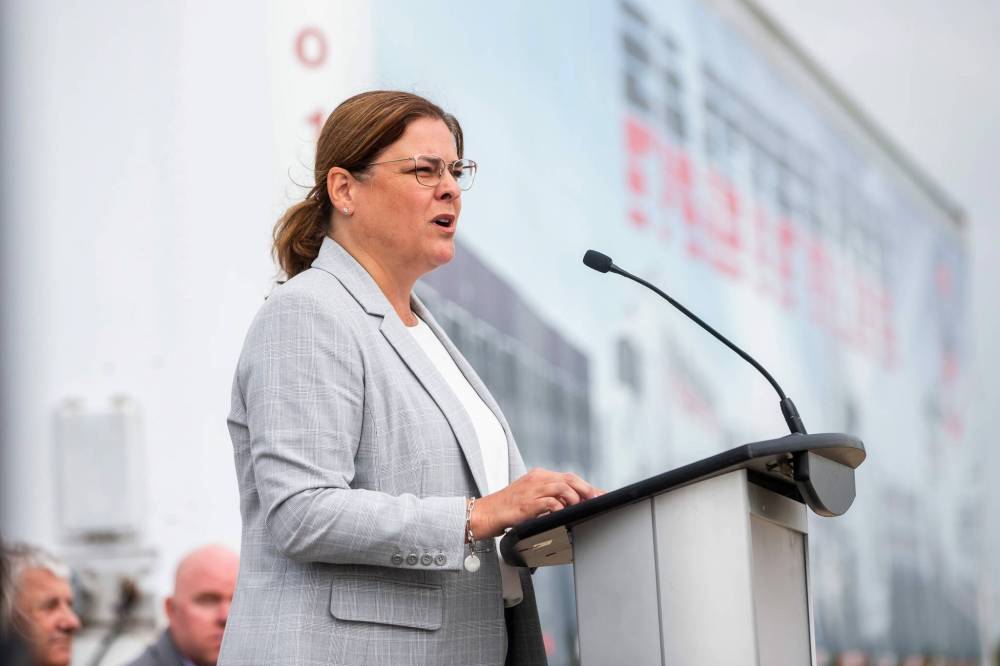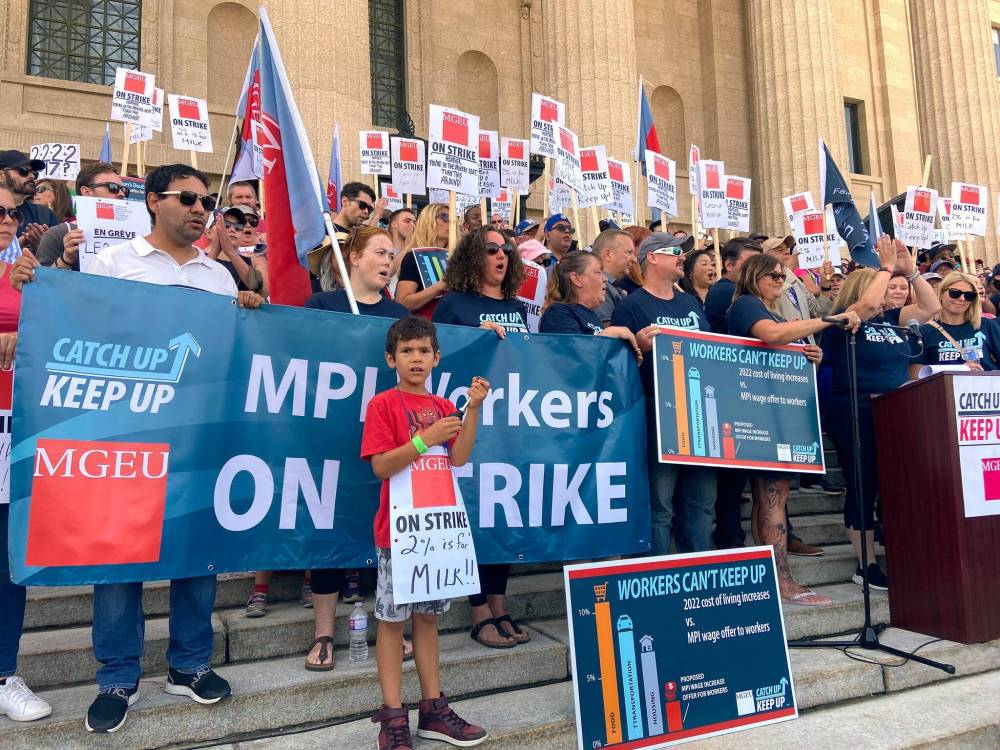Stefanson behind the wheel as Tories take MPI strike out for a wild political spin
Advertisement
Read this article for free:
or
Already have an account? Log in here »
To continue reading, please subscribe:
Monthly Digital Subscription
$0 for the first 4 weeks*
- Enjoy unlimited reading on winnipegfreepress.com
- Read the E-Edition, our digital replica newspaper
- Access News Break, our award-winning app
- Play interactive puzzles
*No charge for 4 weeks then price increases to the regular rate of $19.00 plus GST every four weeks. Offer available to new and qualified returning subscribers only. Cancel any time.
Monthly Digital Subscription
$4.75/week*
- Enjoy unlimited reading on winnipegfreepress.com
- Read the E-Edition, our digital replica newspaper
- Access News Break, our award-winning app
- Play interactive puzzles
*Billed as $19 plus GST every four weeks. Cancel any time.
To continue reading, please subscribe:
Add Free Press access to your Brandon Sun subscription for only an additional
$1 for the first 4 weeks*
*Your next subscription payment will increase by $1.00 and you will be charged $16.99 plus GST for four weeks. After four weeks, your payment will increase to $23.99 plus GST every four weeks.
Read unlimited articles for free today:
or
Already have an account? Log in here »
Hey there, time traveller!
This article was published 31/08/2023 (833 days ago), so information in it may no longer be current.
By any measure, it was a remarkable three days in a story involving a strike, a government auto insurer and a premier under siege.
We start on Monday at 7:30 a.m., when 1,700 employees of Manitoba Public Insurance go on strike after negotiations between the Crown corporation and the Manitoba Government and General Employees’ Union broke down. The strike threatened all aspects of MPI services, including driver and vehicle licensing and Autopac.
On the same day, Premier Heather Stefanson yanked the strike directly into the oncoming path of a provincial election that is expected to begin officially Tuesday.

MIKAELA MACKENZIE / WINNIPEG FREE PRESS FILES
Premier Heather Stefanson yanked the strike directly into the oncoming path of a provincial election that is expected to begin officially on Tuesday.
The premier posted a video on the Progressive Conservative party’s YouTube channel accusing the union of conspiring with the NDP to disrupt MPI services during the election. She claimed she had become directly involved in the dispute to push back against unreasonable union demands.
“That is where I draw the line,” she thundered in her video.
Two days after that, MPI drew headlines with a controversial decision to waive the road-test requirement for Class 5 licences.
Under the interim measure, graduates of MPI’s high school driver-education program were to be licensed without first passing a road test. Others seeking a licence would be required to take their road test with a certified driving instructor under contract to the corporation.
And then, on Thursday — three hours after holding a news conference to double down on that decision — MPI issued a news release throwing the plan into reverse. Road tests conducted by certified driving instructors will be required for all prospective drivers during the strike,
Welcome to Confusion Corner. The only thing that is certain is that politics is most definitely at play in this story. But whose politics? And to what end?
If you subscribe to the same world view as the premier, it is the NDP and its brothers and sisters in the public-sector unions that are playing politics.
The MGEU does, at the top at least, have a close relationship with the NDP. But it’s a long bow to suggest the NDP and this union conspired to trigger a strike right before an election. The MGEU has been involved in a long-term campaign to get settlements that make up for past Tory wage freezes and soften the blow of inflation.
It’s also tenuous, at best, to suggest a public-sector strike automatically helps the NDP in an election.
Even in instances where the public supports government workers at the outset of a strike, the longer it goes on, the greater the chance that public opinion shifts and those walking the picket lines are seen less as crusaders for fairness, and more as greedy and unreasonable civil servants.
If public opinion does shift, it’s a fairly safe bet the NDP would suffer collateral damage from the backlash against a union so closely connected to the party.
The other issue to consider here is that, from all appearances, the Tories actually seem to be relishing the fight with public-sector unions.
Both during the current MPI dispute, and the just-ended strike involving employees of Manitoba Liquor and Lotteries, the Tories have waded into the fray with increasingly inflammatory hyperbole.

MALAK ABAS / WINNIPEG FREE PRESS FILES
MPI workers rally at the Manitoba Legislative Building Wednesday.
In mid August, Andrew Smith, the minister responsible for MLL, said that the NDP and “their union friends” were conspiring to deny Manitobans a “nice cold drink” on a summer weekend. He also said the NDP were conspiring with unions to stop Tory plans to open more private liquor stores.
“(NDP Leader) Wab Kinew and the union bosses don’t want you, the consumer, to have choice,” Smith said in another YouTube video that concluded with the minister opening a bottle of beer.
When you combine Smith’s performance art with the more recent Stefanson video, there is a clear pattern: the Tories seem to be welcoming the strikes at Crown corporations as an opportunity to flex their anti-union muscles to connect directly with their base.
It should also be noted that Stefanson has more or less admitted in her video that she’s taken a more direct role in negotiations. Not only has she claimed to be personally drawing a line against unfair union demands, her government “is in discussions” to approve a change in regulation to allow the road-test requirement to be waived, MPI’s board chair told a news conference Thursday.
Although no one would expect the premier to be a completely impartial bystander in this dispute, she is not supposed to be directly involved in negotiations between a union and a Crown corporation, which has an independent board legal responsible for all collective bargaining.
All of which brings us back to the central question: who has the most to gain from a strike overlapping with a provincial election campaign?
For the Tories, the picket lines are prime opportunities to rail at unions, which calms the nerves of their most loyal supporters.
For the NDP, the strikes are a reminder of the toll the PC government has taken on public servants during its seven years in power.
Lamentably, we’ll all have to wait until the morning after the election to know for sure whose political strategy prevails.
dan.lett@winnipegfreepress.com

Dan Lett is a columnist for the Free Press, providing opinion and commentary on politics in Winnipeg and beyond. Born and raised in Toronto, Dan joined the Free Press in 1986. Read more about Dan.
Dan’s columns are built on facts and reactions, but offer his personal views through arguments and analysis. The Free Press’ editing team reviews Dan’s columns before they are posted online or published in print — part of the our tradition, since 1872, of producing reliable independent journalism. Read more about Free Press’s history and mandate, and learn how our newsroom operates.
Our newsroom depends on a growing audience of readers to power our journalism. If you are not a paid reader, please consider becoming a subscriber.
Our newsroom depends on its audience of readers to power our journalism. Thank you for your support.
History
Updated on Thursday, August 31, 2023 5:45 PM CDT: Updates with latest MPI developments
















